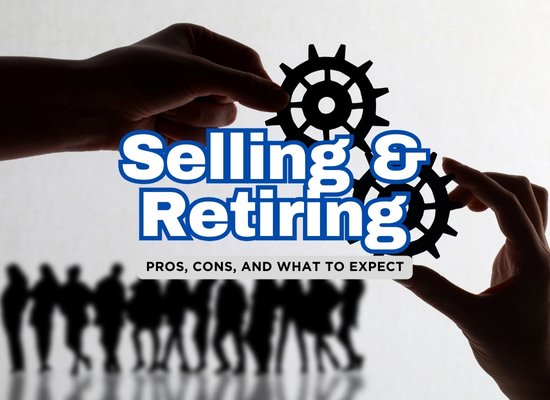After years of hard work, the idea of selling your business and retiring can be both exciting and overwhelming. For many entrepreneurs, it’s a chance to cash in on years of effort, enjoy financial freedom, and finally relax. But selling also means giving up control, facing potential tax burdens, and losing a core part of your identity.
So, is it the right move? Let’s break down the key pros and cons to help you make an informed decision.
✅ Pro #1: Financial Windfall & Security
Selling a successful business can provide a substantial financial payout, securing your retirement and future investments.
🔥 Why It’s a Pro:
- You can capitalize on years of growth and effort.
- If properly structured, the sale can fund a comfortable retirement.
- The lump sum (or structured payout) can be reinvested into passive income sources.
⚠️ Things to Consider:
- Taxes on the sale can take a large chunk of the proceeds.
- Finding the right buyer at the right price may take time.
❌ Con #1: Loss of Identity & Purpose
For many entrepreneurs, their business is part of their identity, and stepping away can create an unexpected emotional void.
🔥 Why It’s a Con:
- You may miss the daily challenges and interactions that kept you engaged.
- Retirement can feel less fulfilling without a new purpose.
- Many former business owners struggle with boredom or feeling unproductive.
⚠️ Things to Consider:
- Plan hobbies, investments, or even part-time consulting to stay mentally engaged.
- Gradually transition rather than making an abrupt exit.
✅ Pro #2: Freedom & Reduced Stress
Running a business means constant decision-making, financial worries, and long hours. Selling allows you to step away from the pressure and enjoy life on your terms.
🔥 Why It’s a Pro:
- No more stress from payroll, operations, or market downturns.
- More time for family, travel, and personal projects.
- You can finally prioritize health, relaxation, and passions.
⚠️ Things to Consider:
- Retirement isn’t for everyone—some entrepreneurs thrive on the excitement of running a business.
- You may miss the challenge and routine that comes with ownership.
❌ Con #2: Potential Regret & Seller’s Remorse
Many business owners second-guess their decision after selling, especially if they feel they sold too soon or at the wrong price.
🔥 Why It’s a Con:
- If the buyer makes big changes, you may not like what happens to your former business.
- Seeing your business thrive without you can feel bittersweet.
- If the financial windfall isn’t managed well, you may feel like you gave up a steady income source too soon.
⚠️ Things to Consider:
- Negotiate a buyout structure that allows for a smooth transition.
- Work with a financial planner to make sure your sale supports long-term financial security.
✅ Pro #3: Opportunity to Pursue New Ventures
Selling your business doesn’t mean you have to completely step away from entrepreneurship. Many former business owners use the proceeds to start a new passion project or invest in other opportunities.
🔥 Why It’s a Pro:
- You can explore new industries or business ideas without financial pressure.
- Passive income options like real estate, stocks, or angel investing become viable.
- Some entrepreneurs start consulting or mentoring to stay involved in the business world without daily management.
⚠️ Things to Consider:
- If you think you’ll want to stay involved, consider negotiating an advisory role in the sale.
- Some new ventures may not be as successful—risk management is key.
❌ Con #3: Unexpected Tax Burden
Depending on the structure of your business and the sale, tax liabilities can be significant, reducing your final payout.
🔥 Why It’s a Con:
- Capital gains tax can take a major chunk of your profits.
- If the deal isn’t structured properly, you may owe higher income taxes on payments.
- Some states have additional business exit taxes or fees.
⚠️ Things to Consider:
- Work with a tax advisor or CPA before finalizing the sale to optimize tax efficiency.
- Consider installment sales or tax-deferred reinvestment options (like a 1031 exchange for real estate).
✅ Pro #4: More Time for Family & Personal Life
Selling your business means you finally get to prioritize your personal life, spending more quality time with loved ones and focusing on your well-being.
🔥 Why It’s a Pro:
- You can be fully present with family and friends without work distractions.
- Retirement allows time for travel, hobbies, and new experiences.
- If health issues have been neglected, you now have time to focus on fitness, relaxation, and stress-free living.
⚠️ Things to Consider:
- Some retirees struggle with too much free time—having a structured routine can help.
- If your family isn’t used to you being around more, it may take some adjustment!
❌ Con #4: Risk of Selling at the Wrong Time
If you sell too soon or in a bad market, you may leave money on the table or struggle to find the right buyer.
🔥 Why It’s a Con:
- Economic downturns or industry slowdowns can lower your business’s valuation.
- If you sell in a rush, you may accept a lower offer than your business is worth.
- Market conditions fluctuate, meaning a better deal could have been possible later.
⚠️ Things to Consider:
- Work with a business valuation expert to determine the optimal selling window.
- If possible, time your exit when revenues and market conditions are strong.
✅ Pro #5: Eliminate Business Risks & Uncertainty
Running a business comes with constant financial and operational risks—from economic downturns to legal liabilities. Selling allows you to cash out while things are good and avoid potential future challenges.
🔥 Why It’s a Pro:
- Avoid market fluctuations that could impact your business’s future value.
- Eliminate liability risks, including lawsuits, compliance issues, or operational failures.
- Free yourself from stress related to hiring, competition, and industry disruptions.
⚠️ Things to Consider:
- If your business is in a high-growth phase, selling too soon could mean missing out on future profits.
- Consider if a partial sale or phased exit would be a better option.
❌ Con #5: Difficulty Finding the Right Buyer
Not every business sale is quick and easy—finding a buyer who meets your financial expectations and vision for the company can be a challenge.
🔥 Why It’s a Con:
- Some buyers may lowball offers, undervaluing what you’ve built.
- If you have a unique or niche business, the buyer pool may be limited.
- Due diligence and negotiations can take months or even years to finalize.
⚠️ Things to Consider:
- Work with a business broker or M&A advisor to identify qualified buyers.
- Be prepared for detailed financial and operational disclosures during the sale process.



